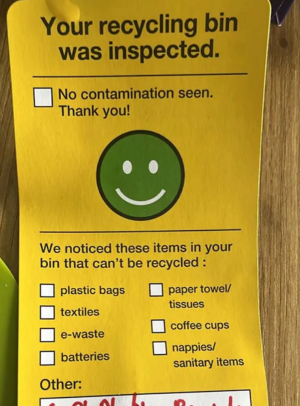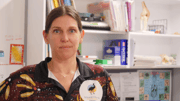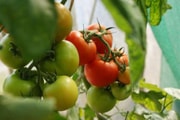Aussies make common bin mistake, get tagged without realising
By
Gian T
- Replies 0
Have you ever wheeled your bin out to the kerb, feeling slightly smug about your recycling efforts, only to find a bright yellow tag attached the next morning?
If so, you’re not alone! Many Aussies are being called out for a surprisingly common mistake when it comes to what we toss in our recycling bins—and chances are, you might be making it too.
A Canberra resident recently discovered this the hard way when he found a note on his recycling bin, courtesy of a new ACT Government initiative.
The tag pointed out two items incorrectly placed in the recycling: soft plastics and receipts.
While it’s easy to assume that anything paper-like belongs in the recycling, receipts are actually a big no-no.
Most are coated with chemicals (like BPA or BPS) that make them unsuitable for recycling, despite their innocent appearance.
But receipts aren’t the only culprits. Disposable coffee cups, used paper towels, and even those biodegradable plastic bags that seem so eco-friendly are all commonly mistaken for recyclables.
In reality, these items should go straight into your general waste bin. It’s a classic case of 'wish-cycling'—putting something in the recycling bin in the hope that it’ll be recycled, even if it shouldn’t be there.
So, what’s behind this new wave of bin inspections? The ACT Government, in partnership with Envirocom Australia, has ramped up its educational program to help residents get their recycling right.
Waste educators inspect around 600 recycling bins and 500 green waste or FOGO (Food Organics and Garden Organics) bins across different suburbs each week.
The aim isn’t to shame anyone or hand out fines—inspectors are there to help us all do better.
How does it work? On bin collection day, inspectors check the contents of bins left out on the kerb.
They only look at the top layer (so don’t worry, they’re not digging through your week-old leftovers), and if they spot something that shouldn’t be there, they’ll leave a tag with feedback.
If you’re ever unsure about someone poking around your bin, rest assured: inspectors carry official government authorisation.
But it’s not just the human inspectors keeping an eye on things. Rubbish trucks in the ACT are now fitted with cameras, allowing drivers to spot contamination as bins are emptied.
If they see something hazardous or a bin that’s chock-full of the wrong stuff, they can tag it too.
In rare cases, if a bin is dangerously contaminated, the driver might refuse to empty it altogether.
Sometimes, a tag simply means your bin is damaged and needs a repair or replacement—so not all tags are about what’s inside.
While some people appreciate the feedback, others feel a bit 'bin shamed'. One Melbourne mum, Kali, shared that she felt embarrassed after being tagged for putting reusable shopping bags in her recycling.
'I thought it was funny that I got bin shamed. I’m sure we’re all guilty of recycling incorrectly—it’s an easy mistake,' she said.
And she’s right! A 2024 survey by Veolia found that 40 per cent of Aussies are unsure which bin to use for certain items, and a whopping 77 per cent don’t know that disposable coffee cups belong in the red (general waste) bin.
Other items that trip people up include bamboo and wood cutlery (63 per cent thought they were recyclable—they’re not!) and biodegradable plastic bags (58 per cent put them in the wrong bin). Both should go in the general waste.
If you’re ever in doubt, there’s help at hand. The Recycle Mate app is a handy tool that lets you search for any product and tells you exactly which bin it belongs in, tailored to your local council’s rules.
It’s a great way to avoid those yellow tags and do your bit for the environment.
Why does all this matter? Proper recycling reduces contamination, improves resource recovery, and protects our recycling and composting systems.
When we get it wrong, whole truckloads of recycling can end up in landfills, undoing all our good intentions.
So, next time you’re about to toss something in the recycling, take a second look. Is it really recyclable? If you’re not sure, check the app or your local council’s website. And remember, you’re not alone—most of us have made a bin blunder or two!
 Have you ever been 'bin shamed' or found a mysterious tag on your bin? What’s the most confusing item you’ve come across when sorting your rubbish? Share your stories, tips, and questions in the comments below.
Have you ever been 'bin shamed' or found a mysterious tag on your bin? What’s the most confusing item you’ve come across when sorting your rubbish? Share your stories, tips, and questions in the comments below.
Read more: Experts warn: stop using this $6 Coles trick for waste disposal, big risk involved!
If so, you’re not alone! Many Aussies are being called out for a surprisingly common mistake when it comes to what we toss in our recycling bins—and chances are, you might be making it too.
A Canberra resident recently discovered this the hard way when he found a note on his recycling bin, courtesy of a new ACT Government initiative.
The tag pointed out two items incorrectly placed in the recycling: soft plastics and receipts.
While it’s easy to assume that anything paper-like belongs in the recycling, receipts are actually a big no-no.
Most are coated with chemicals (like BPA or BPS) that make them unsuitable for recycling, despite their innocent appearance.
But receipts aren’t the only culprits. Disposable coffee cups, used paper towels, and even those biodegradable plastic bags that seem so eco-friendly are all commonly mistaken for recyclables.
In reality, these items should go straight into your general waste bin. It’s a classic case of 'wish-cycling'—putting something in the recycling bin in the hope that it’ll be recycled, even if it shouldn’t be there.
So, what’s behind this new wave of bin inspections? The ACT Government, in partnership with Envirocom Australia, has ramped up its educational program to help residents get their recycling right.
Waste educators inspect around 600 recycling bins and 500 green waste or FOGO (Food Organics and Garden Organics) bins across different suburbs each week.
The aim isn’t to shame anyone or hand out fines—inspectors are there to help us all do better.
How does it work? On bin collection day, inspectors check the contents of bins left out on the kerb.
They only look at the top layer (so don’t worry, they’re not digging through your week-old leftovers), and if they spot something that shouldn’t be there, they’ll leave a tag with feedback.
If you’re ever unsure about someone poking around your bin, rest assured: inspectors carry official government authorisation.
If they see something hazardous or a bin that’s chock-full of the wrong stuff, they can tag it too.
In rare cases, if a bin is dangerously contaminated, the driver might refuse to empty it altogether.
Sometimes, a tag simply means your bin is damaged and needs a repair or replacement—so not all tags are about what’s inside.
While some people appreciate the feedback, others feel a bit 'bin shamed'. One Melbourne mum, Kali, shared that she felt embarrassed after being tagged for putting reusable shopping bags in her recycling.
'I thought it was funny that I got bin shamed. I’m sure we’re all guilty of recycling incorrectly—it’s an easy mistake,' she said.
Other items that trip people up include bamboo and wood cutlery (63 per cent thought they were recyclable—they’re not!) and biodegradable plastic bags (58 per cent put them in the wrong bin). Both should go in the general waste.
If you’re ever in doubt, there’s help at hand. The Recycle Mate app is a handy tool that lets you search for any product and tells you exactly which bin it belongs in, tailored to your local council’s rules.
It’s a great way to avoid those yellow tags and do your bit for the environment.
Why does all this matter? Proper recycling reduces contamination, improves resource recovery, and protects our recycling and composting systems.
So, next time you’re about to toss something in the recycling, take a second look. Is it really recyclable? If you’re not sure, check the app or your local council’s website. And remember, you’re not alone—most of us have made a bin blunder or two!
Key Takeaways
- Many Canberrans are getting yellow tags on their recycling bins as part of an ACT government education program, highlighting common mistakes like putting soft plastics and receipts (which can’t be recycled) into recycling bins.
- The bin inspection program aims to help residents learn what’s appropriate for recycling, composting and waste, with no fines or penalties issued—unless hazardous material is found.
- Coffee cups, used paper towels, bamboo cutlery and biodegradable plastic bags are often wrongly placed in recycling but actually belong in the general waste (red) bin.
- A 2024 survey found a large proportion of Aussies are still confused about which items go in which bins, but the free Recycle Mate app can help you work out where things should go based on your address and local council rules.
Read more: Experts warn: stop using this $6 Coles trick for waste disposal, big risk involved!







